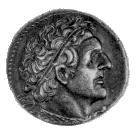Ptolemy I Soter
First ruler (323 - 282) of the Ptolemaic dynasty of Egypt
b. 367/366 or 364 BC (Macedonia), d. 283/282 BC (Egypt)
 Ptolemy was born the son of a Macedonian nobleman and entered the court of Alexander the Great at early age. In 336 he joined the king's bodyguard and from then on followed the king in all campaigns. He became Alexander's personal bodyguard in 330. Ptolemy distinguished himself in military service and became commander of the fleet.
Ptolemy was born the son of a Macedonian nobleman and entered the court of Alexander the Great at early age. In 336 he joined the king's bodyguard and from then on followed the king in all campaigns. He became Alexander's personal bodyguard in 330. Ptolemy distinguished himself in military service and became commander of the fleet.
Following Alexander's death and the division of his empire amongst his generals Ptolemy became ruler of Egypt, most of Lybia and some adjacent Arabia. His troops participated with varying success in the many wars that engulfed the region, variably gaining and loosing control of Cyprus and other territories. His assistance to Rhodes against Roman attack in 304 gave him the title Soter (Saviour in Greek).
Ptolemy's main aim was to secure a stable future for his empire. While bringing the essence of Greek civilization to Egypt and introducing a Macedonian military command alongside the Egyptian administration, he made sure not to alienate the masses. He fused the Greek and the Egyptian religion into the Saraphis cult, with its centre in Memphis. He strengthened the existing administrative network, introducing the previously unknown use of coins. (His portrait above is from one of his coins.) He also spent significant resources rebuilding the temples of the pharaohs, which the Persian invasion had left highly damaged.
In his capital Alexandria Ptolemy founded the Mouseion (Museum), a research institute for the arts and sciences, and established the library that was to be come world famous.
During his lifetime Ptolemy I was revered as a god by parts of the Egyptian population. This reverence extended to the entire country after his death.
home
 Ptolemy was born the son of a Macedonian nobleman and entered the court of Alexander the Great at early age. In 336 he joined the king's bodyguard and from then on followed the king in all campaigns. He became Alexander's personal bodyguard in 330. Ptolemy distinguished himself in military service and became commander of the fleet.
Ptolemy was born the son of a Macedonian nobleman and entered the court of Alexander the Great at early age. In 336 he joined the king's bodyguard and from then on followed the king in all campaigns. He became Alexander's personal bodyguard in 330. Ptolemy distinguished himself in military service and became commander of the fleet.